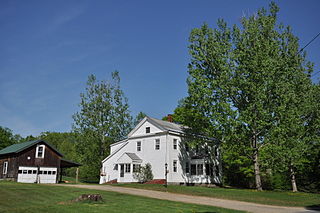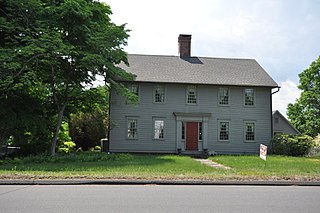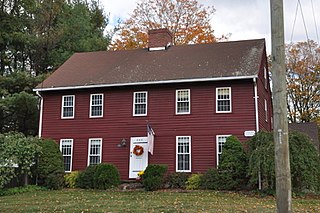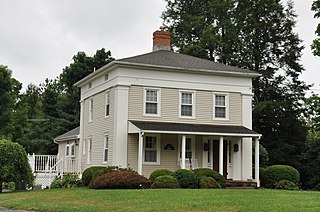
Cannondale Historic District is a historic district in the Cannondale section in the north-central area of the town of Wilton, Connecticut. The district includes 58 contributing buildings, one other contributing structure, one contributing site, and 3 contributing objects, over a 202 acres (82 ha). About half of the buildings are along Danbury Road and most of the rest are close to the Cannondale train station .The district is significant because it embodies the distinctive architectural and cultural-landscape characteristics of a small commercial center as well as an agricultural community from the early national period through the early 20th century....The historic uses of the properties in the district include virtually the full array of human activity in this region—farming, residential, religious, educational, community groups, small-scale manufacturing, transportation, and even government. The close physical relationship among all these uses, as well as the informal character of the commercial enterprises before the rise of more aggressive techniques to attract consumers, capture some of the texture of life as lived by prior generations. The district is also significant for its collection of architecture and for its historic significance.

The Sibley–Corcoran House is a historic house at 387 Upper Valley Road in Washington, Massachusetts. Built about 1813, it is a well-preserved example of a rural Federal style farmhouse, with later Greek Revival alterations. The house was listed on the National Register of Historic Places on September 12, 1986.

The Luman Andrews House is a historic house at 469 Andrews Street in Southington, Connecticut. Built in 1745, it is one of the oldest houses in Southington. Its property was also the site of the early manufacture of hydraulic cement. The 1.8-acre (0.73 ha) property was listed on the National Register of Historic Places in 1989.

The Dr. Daniel Adams House is a historic house at 324 Main Street in Keene, New Hampshire. Built about 1795, it is a good example of transitional Federal-Greek Revival architecture, with a well documented history of alterations by its first owner. The house was listed on the National Register of Historic Places in 1989.

590 West Street is a historic house in Southington, Connecticut. Built about 1790, it is one of the town's small number of surviving 18th-century houses, and a well-preserved example of Georgian colonial architecture. It was listed on the National Register in 1989.

The Roswell Moore II House is a historic house at 1166 Andrews Street in Southington, Connecticut. Built around 1787, it is one of a small number of surviving 18th-century houses in the town, and is a well-preserved example of Georgian architecture. It was listed on the National Register of Historic Places in 2005.

The Dr. J. Porter House is a historic house at 391 Belleview Avenue in Southington, Connecticut. Estimated to have been built about 1728, it is one of the town's few surviving 18th-century houses. It was home from 1754 home to one of the town's largest landowners. It was listed on the National Register of Historic Places in 1989.

Dr. Henry Skelton House is a historic house at 889 South Main Street in Southington, Connecticut. Built about 1748, it is a well-preserved example of colonial Georgian architecture. It was listed on the National Register of Historic Places in 1989.

The Horace Webster Farmhouse is a historic house at 577 South End Road in Southington, Connecticut. Built about 1837, it is the town's only surviving example of a three-bay Greek Revival house. It was listed on the National Register of Historic Places in 1977.

The Valentine Wightman House was a historic house at 1112 Mount Vernon Road in Southington, Connecticut. It was built around 1800 and was added to the National Register of Historic Places in 1989. It has apparently been demolished.

The Woodruff House is a historic house at 377 Berlin Street in Southington, Connecticut. Built about 1780, it is a well-preserved example of an 18th-century Cape with later Greek Revival styling. It was listed on the National Register of Historic Places in 1989.

The Capt. Samuel Woodruff House is a historic house at 23 Old State Road in Southington, Connecticut. Built about 1840, it is a well-preserved and somewhat rare example of a square Greek Revival farmhouse. It was listed on the National Register of Historic Places in 1989.

The Ezekiel Woodruff House is a historic house at 1152 East Street in Southington, Connecticut., Built in the mid-to-late 18th-century, it is a well-preserved example of a Georgian Cape style house. It was listed on the National Register of Historic Places in 1989.

The Urbana Woodruff House is a historic house at 1096 East Street in Southington, Connecticut. Built about 1784, it is a well-preserved example of vernacular Georgian architecture. It was listed on the National Register of Historic Places in 1989.

The Gen. Lewis R. Morris House is a historic house and farm property at 456 Old Connecticut River Road in Springfield, Vermont. Its main house, built in 1795, is well-preserved local example of Federal architecture with later Greek Revival features. The property also includes well-preserved 19th-century agricultural buildings, and was listed on the National Register of Historic Places in 1992.

The Elmore Houses are a pair of historic farmhouses at 78 and 87 Long Hill Road in South Windsor, Connecticut. The two houses, one built before 1819 and restyled in the 1840s, and the other one built new in the 1840s, are locally important rural examples of Greek Revival architecture. They were listed on the National Register of Historic Places in 1985.

The Timothy Dwight Mills House is a historic house at 184 Deerfield Road in Windsor, Connecticut. Built about 1833, it is a well-preserved local example of transitional Federal/Greek Revival architecture executed in brick. It was listed on the National Register of Historic Places in 1988.

The Woodbridge Farmstead is a historic house at 495 Middle Turnpike East in Manchester, Connecticut. Built about 1835, it is a well-preserved example of a Greek Revival farmhouse, with a history of ownership by a single family extending over more than 150 years. It was listed on the National Register of Historic Places in 1999.

The Dr. Andrew Castle House, also known as the Castle-Russell House, is a historic house at 555 Amity Road in Woodbridge, Connecticut. Built in 1838, it is a locally distinguished example of high-style Greek Revival architecture, and is notable as the home of three prominent local physicians. It was listed on the National Register of Historic Places in 2000.

The Reuben Curtiss House is a historic house at 1770 Bucks Hill Road in Southbury, Connecticut, United States. With a construction and alteration history dating from the late 18th to 20th centuries, the house is one of Southbury's finest examples of residential Greek Revival architecture. It was listed on the National Register of Historic Places in 1993.






















